“On March 25, Human Rights Ombudsman Sergio Morales' wife, Gladys Monterroso, was abducted by unknown assailants and released some 15 hours later after she was beaten and raped. Early indications suggested that the kidnapping may have been intended to intimidate Morales into backing off of his efforts to highlight and investigate human rights violations committed during Guatemala's internal conflict. Specifically, the attack could have been designed to stop him from making public sensitive records from the Historic National Police Archives. This potential link led the International Commission Against Impunity in Guatemala (CICIG) to take on the investigation.”
Date: 06/08/2009
Refid: 09GUATEMALA539
Origin: Embassy Guatemala
Released: 30/08/2011
http://wikileaks.org/cable/2009/06/09GUATEMALA539.html
This story has continued, with, fortunately, very positive results. And it reveals much to us about the nature of evidence en masse – how large collections of records can be necessary if we are to fully understand the systems and governance that supports the actions of abusive or just societies.
Having discovered this trove of police records in 2005, Guatemalan human rights investigators established the Project to Recover the Historic Archives of the National Police. The project had, by October 2009, digitised eight million documents from the archive, and cleaned and organized another four million.
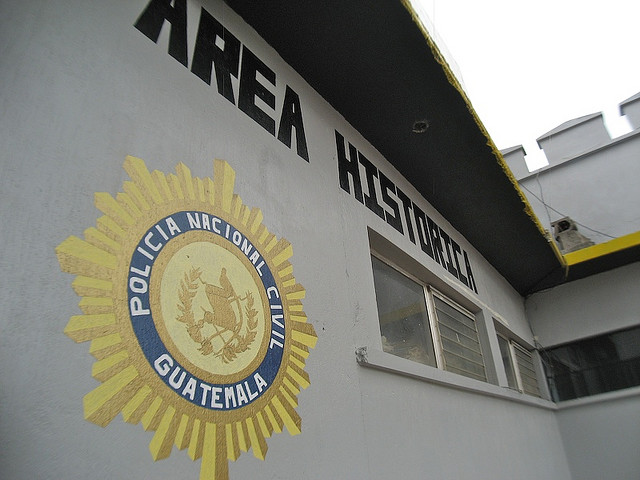
Photo credit:
Xeni's photostream
This article was originally published in the South Korean national newspaper, Hankyoreh, in September 20th, 2011. This is an English translation of the article.
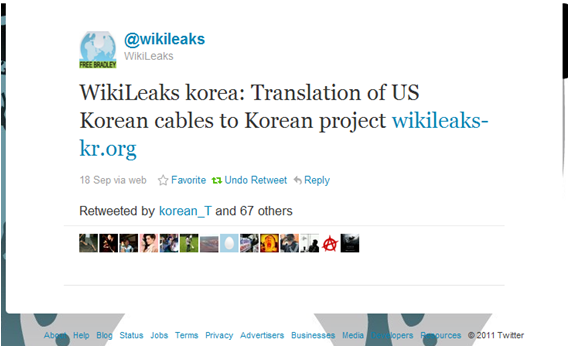
‘Korean-translated version of WikiLeaks’ launches as a project
by Jongchan Park
Websites sharing Korean-translated versions of the U.S. embassy cables which were leaked through the whistleblowing website WikiLeaks are bursting out around the country.
The most well known one is ‘WikiLeaks Korea’. The main page of this website informs that it is “A project which accepts voluntary Korean-translation of cables related with South Korea”. It also presents the goal of “shedding light on the Truth rapidly, with the united power of Internet users.” It emphasized that “To assure volunteers in protecting their translated cables, this website provides not only privacy protection but also a secure system that can block any attempt of random deletion.” If some groups getting embarrassed by the ongoing translation project try deletion or attacks, it plans to instantly release the IPs publicly and block them, and the archive is constructed in a way that it can be swiftly restored by its real-time backup system.
WikiLeaks Korea has currently posted 25 translated cables and 12 cables which are in the process of translation. Among the 25 cables, raw materials of issues which had been reported partially in national press exist as follows: ‘Republic of Korea: 1987 Annual Terrorism Report’, ‘Lee Myung-bak Dreams Up A Canal Project’, ‘Senior KBS Correspondents See GNP's Victory Inevitable’.
 "You may not be interested in psychological warfare, but psychological warfare is interested in you."
"You may not be interested in psychological warfare, but psychological warfare is interested in you."
-Xu Hezhen
As the U.S. has increased its use of Psychological Operations (PSYOP), the acknowledged effectiveness of its methods has led to global use of PSYOPS tactics by both U.S. allies and enemies. Recent reports indicate that U.S. PSYOP has even extended to target U.S. citizens - which constitutes a violation of law.
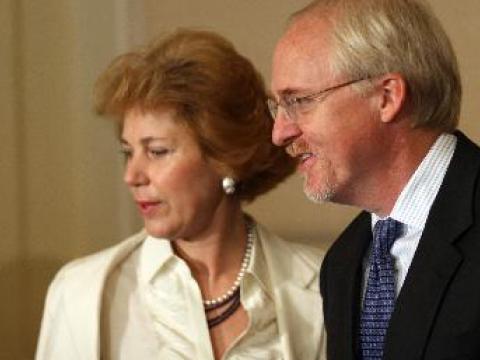
A secret diplomatic cable [08SOFIA185], released by Wikileaks and dated March 27, 2008, reveals that Bulgarian Ambassador in Washington, DC, now serving a second term there, Elena Poptodorova and then Deputy Defense Minister, Sonya Yankulova, have informed American Ambassador in Sofia John Beyrle about plans to increase the Bulgarian contingent in Kandahar by fifty rangers, months before the official decision of the Bulgarian cabinet.
The cable is also shading light on the steady pressure exerted by US officials on the Government of Bulgaria to expand its Afghan contribution with new contingent.
In two separate meetings, Poptorova and Yankulova have stressed to Beyrle that this had been sensitive information while the diplomat wrote in the cable, classified as secret, that both ladies must be under a strictly protect status.
"Bulgaria is set to announce a decision to deploy an additional 50 soldiers to take over the Entry Control Point Number Four mission at Kandahar Airfield. It is keeping this decision under tight wraps for now. We expect the formal decision will be made just before the NATO Summit, and the announcement itself probably in Bucharest by the Prime Minister. Both Ambassador Poptodorova in Washington and Deputy Defense Minister Yankulova (strictly protect) have foreshadowed this outcome and the sensitivity of the decision and announcement timing," Beyrle informs in his report.
"While a formal decision is still days off, and there is still some scope for a mis-step, we would be surprised if Bulgaria does not come through," the Ambassador concludes.
The records continuum model was developed by Monash University’s Frank Upward in the mid 1990s as a way of expressing the many recordkeeping processes that occur in society and the contingencies inherent in them. It explains the way in which records are made, organised, shared and used in a variety of times, places and contexts under the influence of changing legal, political and practical constraints. It has been written on extensively, and there are some references included below, so I do not propose to expand on it in detail here.
My reason for introducing it is that as the events of CableGate 2 unfolded over the last couple of weeks I was struck with the way in which the expanded possibilities for use, sharing and reclaiming records we have seen with the cables release have demonstrated what, in continuum terms, is labelled ‘Fourth dimension’ recordkeeping; that is, the formation of a pluralised archive which exists beyond spatial and temporal boundaries, transcends state and economic controls and which actually encourages and incorporates people’s participation and comment. An archive which reflects a truer, less filtered and more inclusive perspective on the events documented in the records.
The qualities that set CableGate 2 apart from traditional archives and even from prior releases by WikiLeaks, making it a truly ‘Fourth dimensional’ archive, are essentially about participation and plurality.
Participation
Authored by Nikolas Kozloff
"Ambivalent" Relationship on Drug War
As the political relationship deteriorated between the Bush administration and Chávez, so, too, did collaboration on the U.S.-sponsored drug war. Recently released cables document the testy and "ambivalent" dynamic, with U.S. ambassador William Brownfield commenting that Chávez's anti-drug czar Luis Correa appeared to be "penalizing" a non-governmental organization called Alianza "for having too close of a relationship with us."
Brownfield was rather suspicious of Correa, noting to his superiors that the Venezuelan was a professional intelligence officer. Before taking up his post heading up anti-drug efforts, Correa directed a technical unit that targeted the U.S. Mission. Correa was responsible for monitoring U.S. Embassy communications with teltap and cellular intercept equipment. "Notches on Correa's belt" included turning a U.S. government informant and "penetrating an unclassified email system." Correa, Brownfield explained, directed a computer hacker who was able to obtain Embassy staff's e-mails and conducted surveillance of DEA agents, infiltrating the organization in the process and sabotaging equipment.
Not surprisingly, bilateral anti-drug cooperation almost hit rock bottom, and the only active joint project consisted of a port security project. After months of delay, the Venezuelans authorized U.S. officials to conduct an anti-drug training session. However, several no-shows failed to attend as they had become "apprehensive" about political persecution. Correa also snubbed the U.S. by refusing to attend the event, claiming that a Chávez coup plotter served on the board of directors of Alianza which sponsored the event.
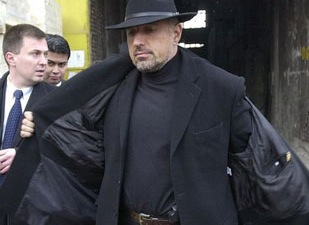
Bulgarian Prime Minister, Boyko Borisov, in an interview for the political TV show “Face to Face” with host, Tsvetanka Rizova, September 4, 2011. (Video here):
TR: There was information, released by WikiLeaks, showing your position on GMO had been quite hypocritical.
BB: Released by whom?
TR: Hmm, I don’t know if you are aware that your ministers went to…
BB: I do not read them.
TR: Well, let me tell you. Your ministers…
BB: I do not read them.
TR: Your ministers went there and have said that due to public pressure we will not plant GMO crops, but otherwise we want them and count on Europe to make us do it.
BB: I think that…
TR: What are our guarantees that you are sincere when it comes to the environment?
BB: (thinking) What minister went there?
TR: Miroslav Naydenov (Agriculture Minister) is cited there.
BB: I asked him; he said he did not go. And he did not discuss any such matter.
...
BB: And about GMO… The way you presented it, it looks like someone had been a hypocrite.
TR: Yes, this is how it looks like, according to WikiLeaks; it was simply hypocritical.
BB: Who is WikiLeaks?
TR: How come, who is WikiLeaks? (BB: Who does it represent; who decides…) The ones who release the cables…no one has denied these cables so far.
BB: Yes, because no one wants to deal with them, because once they start denying them…
TR: Don’t you think that if this was a lie, there would have been some official statement? Everyone keeps quiet; it means they are true.
BB: If they were true, they would have published them all, from A to Z, not selectively, to choose and release depending on when and what is convenient… in connection…I am talking about those on Bulgaria.
TR: We must come to conclusion now.
The Guardian has now responded to Wikileaks' accusations. They state that they were told that the password was only temporary, and that the server from which the file was downloaded was only live for a few hours.
They also claim that the file was available on BitTorrent at some point.
This statement raises a valid point, namely how the files came to be posted on the web. Had their present location been controlled by Wikileaks, the file would have been removed by now. According to Spiegel (original), the file was posted online by "supporters", after it was handed back by Daniel Domscheit-Berg, who had seized the Wikileaks servers. According to Heise, he was asked to return the old Wikileaks website, which he did. The file in question must have been transferred along with it.
Please see our previous coverage for more information.
It finally happened. An old cablegate file was detected on the internet, and it could be decrypted with a password that was published by a Guardian journalist. The file is not in an obvious location, and it may be doubted that anyone would have ever found it, along with the matching password, had it not been for Der Freitag publishing an article on the matter, which was then followed up by several other news outlets. Der Freitag is a media partner of Openleaks and has strong ties with the Guardian.
WL Central had guessed the source of the password early on but decided not to publish.
Wikileaks responded with the following statement:
"Statement on the betrayal of WikiLeaks passwords by the Guardian.
GMT Wed Aug 31 22:27:48 2011 GMT
A Guardian journalist has, in a previously undetected act of gross negligence or malice, and in violation a signed security agreement with the Guardian's editor-in-chief Alan Rusbridger, disclosed top secret decryption passwords to the entire, unredacted, WikiLeaks Cablegate archive. We have already spoken to the State Department and commenced pre-litigation action. We will issue a formal statement in due course.
WIKILEAKS"
For our previous coverage of the topic please see this link.
Authored by Nikolas Kozloff
As more and more WikiLeaks cables get released, the Brazilian-U.S. diplomatic relationship has become increasingly illuminated. Though somewhat wary of each other, Washington and Brasilia sometimes saw eye to eye on matters of geopolitical importance. Take, for example, both countries' handling of Venezuela's Hugo Chávez. Under the helm of Luiz Inácio "Lula" da Silva, Brazil cultivated a strategic alliance with Venezuela and publicly the two nations embraced South America's "pink tide" to the left. Yet, WikiLeaks documents reveal that Brazil may have shared Washington's concern over Chávez's rising geopolitical importance, particularly in the Caribbean theater.
During the Bush years, American diplomats kept a close bead on Venezuela's growing partnerships in areas far afield. In Jamaica, for example, U.S. officials conducted a "sustained effort to dissuade" the authorities from supporting Chávez's bid for a seat on the United Nations Security Council. Concerned over Venezuela's rising star in the region, the Americans met with the Jamaican political opposition. Writing to her superiors in Washington, U.S. ambassador in Kingston Brenda Johnson expressed "concerns over the influence of Venezuelan money and energy supplies in Jamaica in the years ahead."
Monitoring Chávez in Jamaica
During a local cricket match, Bruce Golding of Jamaica's opposition Labour Party approached the ambassador to request a meeting. Asking that the U.S. hold the information in "strict confidence," Golding revealed that his party's concern over Chávez had "heightened in recent weeks." Confidentially, he continued, a "senior person in the government" had passed him "sensitive inside information," and "a number of persons within the government" were "frightened over the secrecy" concerning Jamaica's official dealings with Chávez.
- Bruno Latour, Visualization and Congnition: thinking with eyes and hands, Knowledge and Society, 1986.We take for granted that there exist, somewhere in society, macro-actors that naturally dominate the scene... The problem is that these entities could not exist at all without the construction of long networks in which numerous faithful records circulate in both directions, records which are, in turn, summarized and displayed to convince.
- Julian Assange, ‘State and Terrorist Conspiracies’, iq.org, November 10, 2006.Authoritarian regimes give rise to forces which oppose them by pushing against the individual and collective will to freedom, truth and self realization. Plans which assist authoritarian rule, once discovered, induce resistance. Hence these plans are concealed by successful authoritarian powers. This is enough to define their behaviour as conspiratorial.
Recordkeeping and power are inextricably bound together. The act of making a record and how it is kept can shape the current and future reality for an individual or group - in some cases to oppress or control, in some to liberate. This was strikingly evident in the stories emerging from WikiLeaks’ latest batches of cable releases where they touched on recordkeeping and archives.
Here are nation states choosing to open or restore the archive in pursuit of more open societies, while others seek to close or corrupt it - their actions correlating closely with the extent to which they exert oppressive and unjust power over the citizenry. We see these macro-actors using Latour’s ‘long networks’ of recordkeeping to propagandise their oppressive practices, or indeed to strike agreements with other states or the remnants of former police or security organisations on the management and protection of records and archives, in pursuit of Assange’s concept of concealed, conspiratorial plans. Here are a few examples.
According to Spiegel, a complete version of Cablegate has been available on the internet. This is their account of the story:
Julian Assange uploaded an encrypted archive containing Cablegate to the Wikileaks webserver, to share it with an associate, to whom he also gave the password. When Daniel Domscheit-Berg left the organization together with the Architect, he took the content of the webserver with him. He eventually returned some of the data a few weeks later.
At this point the narrative is not entirely clear. Spiegel goes on to say that supporters published the data on the web, along with the encrypted Cablegate file. Simultaneously, the associate published the password. The vulnerability remained unnoticed, until Openleaks staff pointed it out.
WL Central could not verify these claims. It is however clear that the vulnerability was first pointed out by Der Freitag, a media partner of Openleaks.
In a variety of aspects, this is a very strange story. First, it seems odd to use the main Wikileaks website for transfer of sensitive data. This could easily have been done by other means, in a more secure way. Next, one is left wondering how anyone could have overlooked a massive archive in a hidden subdirectory when setting up a website. Most striking is the fact that someone would be irresponsible enough to publish a password.
Openleaks staff must have known about this vulnerability for some time, but did not bother to reveal it to those in charge of the website, nor did their media partners. It is certainly right to report about it, but it should be done in a responsible manner, making sure the file is removed before this information is publicly available.
Wikileaks releases 55 thousand cables from the U.S. embassies in Iran, Afghanistan, Israel, Russia, and Venezuela, among others. Through their official channels they asked for citizen participation in analyzing them. They also asked that they post their finds by sending them to @wikileaks on Twitter under the hashtag #wlfind. You can take a look at the cables yourself by visiting this link: http://wikileaks.org/tag/TU_0.html or http://www.cablegatesearch.net/search.php.
As a consequence of this release, Wikileak's Californian DNS hoster, Dynadot, "has received a PATRIOT act production order for information on Julian Assange", according to their website. It also mentioned that it had been complied and that "the production order seeks all available information on Julian Assange and WikiLeaks, for the US grand jury in Alexandria, Washington."
On the 1st of August 2008 Syrian General Muhammad Suleiman, who also bore the title of Special Presidential Advisor for Arms Procurement and Strategic Weapons for President Bashar al-Assad, was murdered in highly mysterious circumstances. General Suleiman was shot three times in the head, neck and stomach at his home in the exclusive Rimal al-Zahabieh resort in the Mediterranean city of Tartous. It was speculated then that the shots came from a sniper located on a boat, which explained how the top level security forces surrounding Suleiman were avoided. At this time relations between Syria and Israel were at their worst and the talk of war was in the air, particularly due to Syria’s intent on upgrading its nuclear and chemical weapons facilities, a strategy headed by Suleiman. Therefore, most of the international press, most notably The Sunday Times, stated as a fact that it was Israeli intelligence agency Mossad who was to blame.
An inside job
Recent cables published by Wikileaks, however, shed a new light on the assassination, revealing a very delicate multi-lateral diplomatic situation. The fact that this information came from the U.S. embassy in Paris is particularly revealing. In cable #08PARIS1717 Ambassador Stapleton, says that Boris Boillon, adviser at the French presidency, asserted to him that “the killing seemed to be some sort of inside job”.
During the 7 years Aung San Suu Kyi, Burma's world renowned pro-democracy dissident, was under her second house arrest - from 2003 through 2010 - nothing was publicly known about the diplomatic efforts to promote democracy between the international community and the Burmese military dictatorship.
The U.S. and European states imposed economic sanctions to pressure the regime, and ASEAN (Association of South East Asian Nations) member countries publicly denounced Burma without meaningful results. Recently released Southeast Asian cables by WikiLeaks, along with cables from India and China, provide a clearer picture of international efforts - from the frank reluctance of ASEAN member countries to push the Burmese regime in private talks to reports from inside-Burma.
Burma: NDL leadership expel competent young pro-democracy members, while the regime’s ‘economic patronage network’ remains firm
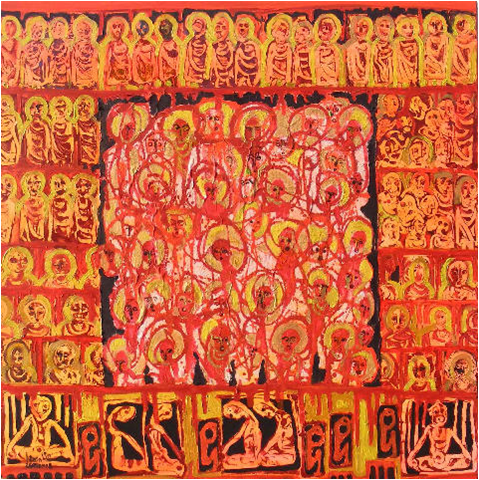
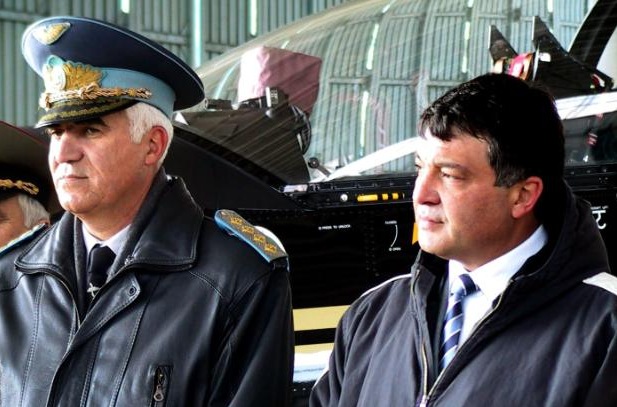
Bulgaria's State Agency for National Security (DANS) is probing within its authority revelations of the whistle-blowing site WikiLeaks that former Chief of General Staff, Nikola Kolev, has provided valuable information to the US Embassy in the beginning of 2003.
The information was reported by Prime Minister, Boyko Borisov, during parliamentary control Friday as a response to a question coming from the Member of the Parliament from the far-right, nationalist Ataka party, Pavel Shopov.
Borisov explained DANS does not have investigative functions, but if there is evidence confirming the Wikileaks report, this evidence would be turned to the Prosecutor's Office.
The cable in question was released on June 15 by WikiLeaks and provided to the project for investigative journalism www.bivol.bg.
Kolev, who is currently Chief of Staff of President, Georgi Parvanov, and the Presidential Office declined any comments at the time.
MP Shopov replied he was satisfied by Borisov's answer because details were not as important as the fact the case is being investigated.
Meanwhile, Bivol.bg commented they were still not able to find out the exact meaning of SIMO, which in another cable, has allegedly confirmed that Borisov was involved in major traffic in methamphetamines.
 On November 10, 2009, a blackout left 18 of the 26 Brazilian states without power, also effecting Paraguay. At the time, it was the worst accident of its kind for the Itaipu Plant, from its inauguration in 1982. Paraguayan and Brazilian authorities reported a "total shutdown" of the turbines. A map of the event can be accessed here.
On November 10, 2009, a blackout left 18 of the 26 Brazilian states without power, also effecting Paraguay. At the time, it was the worst accident of its kind for the Itaipu Plant, from its inauguration in 1982. Paraguayan and Brazilian authorities reported a "total shutdown" of the turbines. A map of the event can be accessed here.
The explanation of the event was never clear and is still considered the largest blackout occurred in the country. Brazilian authorities, specifically the Minister of Mines and Energy, Edison Lobao pointed to meteorological reasons for the event, which was confirmed later by a government commission to study the only open case.
Along with insight on Hambre Cero ('Zero Hunger'), cables released by WikiLeaks provide previously unreported dark sides in inner management of social welfare programs launched by the Ortega government. This article reports the way social welfare programs are dealt with in the midst of budget deficits based on the cables, mainly focusing on one of the major social welfare projects of Ortega government, Programa Amor ('Program of Love') and other social welfare programs for street children in 2007-2010.

What is Programa Amor?
Programa Amor is one of many social welfare programs that President Ortega and his FSLN party presented to the public in 2007. The stated goal of the program was to provide education and other opportunities to 25,000 street children to break away from some of the worst forms of child labor. Programa Amor has been headed by the First Lady Rosiario Murillo and Ministries of Family, Health, Education, and the government.
Cable: Concerns of Ministry of Family insiders on Programa Amor; It forces children to their home which drive them back to the street
09MANAGUA1318 reveals that people inside the Ministry of Family (MiFamilia), which is a focal point of implementation of Programa Amor, confessed their concerns on the program’s general operating style. The program sends children back to their home in the evening after daytime education courses of the shelters, and this poses a serious threat to the children, since most of them are forced to find places at night other than their homes, which they originally ran away from.
Hambre Cero (“Zero Hunger”) has been an ambitious social welfare program that president Ortega’s FSLN(Sandanista National Liberation Front) party declared in 2007. More than 3 years after that, cables released by WikiLeaks reveal hidden mechanisms and progression of the programs throughout 2007-2010.
Hambre Cero ‘veiled in secrecy’ in discriminatory selection of beneficiaries with no independent monitoring systems
Hambre Cero(“Zero Hunger”) is a state-led welfare program to help ‘eradicate poverty until 2012’ by providing Productive Parcels, which is a packet of livestock, goods, and services including various training needed to establish a self-supporting production of food in the poor areas. The government’s goal is to reach 75,000 families. And since the reported number of people living below the poverty line is 2,300,000 individuals in the country, the process of selecting beneficiaries is an important factor that should be impartial and transparent. However, recently released cables detail how the progression of planning the program and defining standards had been opaque since the first step.
Cables released from WikiLeaks provide important material in the ‘evidence war’ between ICC prosecutor Luis Moreno-Ocampo and Kenyan politician William Ruto.

The cables support Moreno-Ocampo’s arguments that exposing information about critical witnesses would be a severe threat to them and that allegations on Ruto’s involvement in the extrajudicial killings in 2007-2008 post-election violence are recognized by the U.S. embassy, which is far from ‘rubbish rumors picked up by rag blogs’ as Ruto criticized the evidences the allegation is based on.
William Ruto, the Waki Commission, and the tragedy of extrajudicial killings during 2007-2008 post-election violence in Kenya
Extrajudicial killings during 2007-2008 post-election period in Kenya has been condemned internationally, mainly by the UN Special Rapporteur on extra-judicial killings, Alston. WikiLeaks received the Amnesty 2009 New Media Award due to its notable work on leaking and reporting about the hundreds of extrajudicial killings tacitly approved by the Kibaki government and widely conducted by Kenyan Police force working with armed militias.
Among the leaked material is a report titled The Cry of Blood: Report on Extra-Judicial Killings and Disappearances, which is written by the Kenya National Commission on Human Rights (KNCHR). The UN acknowledged the report’s credibility after confirming that the information found in the report is backed by investigation results of other civil society organizations and that of the preliminary research done by UN Special Rapporteur team in 2009.
Below are photographs taken as evidences of extrajudicial killings in the report:
Theme by Danetsoft and Danang Probo Sayekti inspired by Maksimer